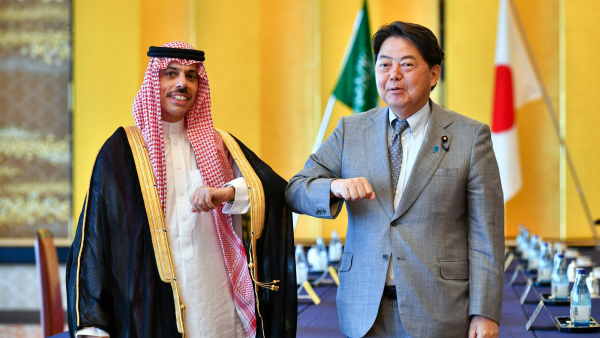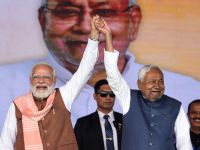Before the 20th century, Japan turned its attention to the Middle East. Relations with West Asian actors such as Iran had started in different dimensions in the previous centuries. After the Cold War, oil, energy, and strategic relations with America increased the position of the Middle East in Tokyo's foreign policy.
Japan's conservative ruling party (The Liberal Democratic Party) increased its majority with a decisive victory in the July 10, 2022 election. Although Mr. Abe, the longest-serving prime minister of contemporary Japan, has passed away, the decisive victory of the ruling party can have effects on the country's economy and foreign policy regarding the Middle East.
The Seven Priority Areas of Japan’s Foreign Policy ?:
— Kim (@ChowkidarKim) March 8, 2022
Free and Open #IndoPacific .
US - #Japan
China, Russia, S Korea.
N Korea.
Middle East.
Create New Rules.
Global Challenges. pic.twitter.com/JYIqvgh2OA
Political and geopolitical dimensions
The goals and priorities of foreign policy in the Japanese Constitution are mentioned in Articles 7, 9, 41, 72, 73, and 98. Japan's foreign policy in the Middle East is largely influenced by variables such as its strategic alliance with the United States, the supply of fossil fuels, and its peace-seeking foreign policy and counter-terrorism policy. Therefore, some issues including strengthening the alliance between Japan and the United States, addressing the situation in the Middle East, and dealing with global challenges in order to maintain and promote Japan's national interests in the Middle East are among Japan's foreign policy priorities.
Japan has a direct stake, and is uniquely suited for helping the Middle East adapt to a changing geopolitical landscape, FP contributors argue.https://t.co/4CbpvvV59t
— Foreign Policy (@ForeignPolicy) September 16, 2021
In addition, Fumio Kishida, the current Prime Minister of Japan, is likely to make efforts to revise the Japanese Constitution and change Article 9,(requiring the country to be pacifist), Japan's military preparedness to deal with risks, and increase the country's military budget.
This can have an important effect on the power of this country in the Middle East, the maritime domain, looking beyond the borders, protecting the interests of Japan, and increasing the global presence of this country.
From a political point of view, although the importance of Japan's relations with the United States and the quadrilateral security dialogue between Japan, Australia, India, and the United States has been maintained against the hegemony of China, the interests are not always the same. Because the Middle East is geographically much closer to Japan than the West. In addition, despite reducing the US's role in the region, the Middle East is still a very important region with economic and geopolitical interests for Japan.
Although Japan is not a member of NATO and a permanent member of the United Nations Security Council, with measures and approaches such as the creation of the National Security Council (NSC), the approval of the National Security Strategy (NSS), and the National Defense Program Guidelines (NDPG) in Japan, the country is ready to play a greater role in the Middle East. For example, Japan should be ready to protect its interests and important strategic oil and energy shipping lines from the Middle East, Strait of Hormuz, Strait of Malacca, etc. Since 2020, the activities of the Japanese Force in the waters of the Middle East have increased to ensure the safety of ships related to Japan.
In addition, it seems that Japan is thinking about promoting its national interests by strengthening its foreign policy implementation system and diplomatic missions. Also, in the past few years, Japanese officials such as the Prime Minister, the Minister of Foreign Affairs of Japan, and other officials have visited countries such as Egypt, Palestine, Israel, Jordan, Turkey, Iraq, Iran, Qatar, etc.
Meanwhile, on the one hand, Tokyo's fear of China's increasing and all-encompassing influence in the Middle East has caused Japan to make more efforts. On the other hand, despite having close relations with NATO, Japan refrains from interfering in the region and has a good reputation. Therefore, Tokyo still has an important advantage as a middle power and a bridge-builder for friendship in the Middle East.
It seems that Japan has actually been able to continue to treat the five pillars of the Middle East, Saudi Arabia, Egypt, Iran, Turkey, and Israel, in such a way that none of them consider Japan as their enemy.
#GALLERY: #Japan’s former Prime Minister #AbeShinzo was shot dead on July 8, he was 67. The longest serving PM in Japan, he was seen as a friend to the #Arab world and played a big role in strengthening relations with the Middle East
— Arab News (@arabnews) July 8, 2022
However, an important part of Japan's foreign policy is the confrontation between Iran and the United States in the Middle East. In order to protect its interests, Tokyo is eager to maintain its close relations with Iran. In case of any new nuclear agreement with Iran, Japan can also be in a good economic and political position. In addition, Tokyo is still trying to be a mediator in the conflict between Palestine and Israel, the differences between Iran and Saudi Arabia, and the Arabs and Israel.
In this framework, it supports the Abraham Agreement, establishing long-term stability in the region, the two-state solution, supporting the ceasefire in Gaza, and reducing the tension in Yemen. Also, Japan's participation in UN peacekeeping operations, development assistance, and other technology investments in human security is another part of Japan's approach to the Middle East.
Tokyo is also concerned about terrorist groups in the Middle East in the field of security and counter-terrorism. Therefore, in its approaches and actions, it emphasizes efforts to fight terrorism, create stability and prevent the re-emergence of violence.
Economic and cultural dimensions
Japan sees an important part of its foreign policy goals in the Middle East from the perspective of geo-economics and economics. In its foreign policy in the Middle East, Tokyo has focused on peaceful economic approaches and tools such as investment by Japanese companies, assistance in attracting foreign capital, and an export-oriented approach in relations with the Middle East (with complementary economies).
In addition, Tokyo is facing increasing dependence on the Middle East crude oil. Japan is one of the largest importers of liquefied natural gas and the third largest importer of petroleum products and crude oil in the world.
Due to Japan's policy to reduce the import of Russian natural gas and oil to zero, Tokyo imports more than 90% of its crude oil from the Middle East. Japan's increasing dependence on oil in the region is while it is also seeking to supply liquid natural gas resources. Therefore, it is important for Tokyo to diversify energy sources, ensure the security and stability of the energy market, and complete security of energy transmission routes from the Middle East.
WATCH: The UAE spacecraft, HOPE, is now on the launch pad in Japan, scheduled to launch Monday. This will be the Arab world's first attempt at a mission to Mars pic.twitter.com/HqUcyLzPZ3
— Bloomberg Quicktake (@Quicktake) July 19, 2020
In the meantime, due to the fact that Japan's trade deficit has reached about 8 trillion yen due to the increase in oil prices and the decline of the yen, it is considering efforts to reduce the price and increase oil production.
The postponement of the visit of the Japanese Prime Minister to the Middle East countries (after the positive test of COVID-19) increased Tokyo's worries in this area .On the other hand, Japan has tried to strengthen its relations with the countries of the Middle East in a wide range of fields, such as various aids, free aid, and grants, supporting infrastructure and economic stabilization, achieving economic reforms, eradicating corruption, granting loans, etc...
Also, in promoting economic diplomacy, Japan pursues aspects such as strengthening free and open global economic systems, supporting the expansion of trade and investment of Japanese companies, penetrating the regional market, competing with other players such as China in the Middle East, etc.
In the field of culture and soft power, Tokyo has continued to pay attention to strengthening public diplomacy, granting scholarships to students, giving aid such as 30 billion dollars in the recent Tunisian conference, introducing Japanese culture, exchanging and promoting Japanese language education, etc. Japan has a very good position in the polls of the Middle East countries.
Vision
The upcoming visit of the Japanese Prime Minister to the Middle East will be his first trip to the region since January 2020. This trip, along with the periodic trips of Japanese officials in the past years, shows the necessity and more attention of Japan to the modern Middle East. In fact, the absence of historical and severe differences or enmity between Japan and Middle Eastern countries, the absence of a colonial past in the region, financial and human capabilities, advanced technology, and suitable brand of Japanese companies are important platforms for expanding relations in the future.
Even now, the consequences of the Ukraine crisis have provided new and important opportunities for Japan's energy cooperation with the Middle East. However, the expansion of China's comprehensive presence and influence in the Middle East, political tensions and the security situation in the region, the possibility of attacking Japan's interests, etc. are among the challenges to strengthening Japan's political and strategic relations with the Middle East actors.







